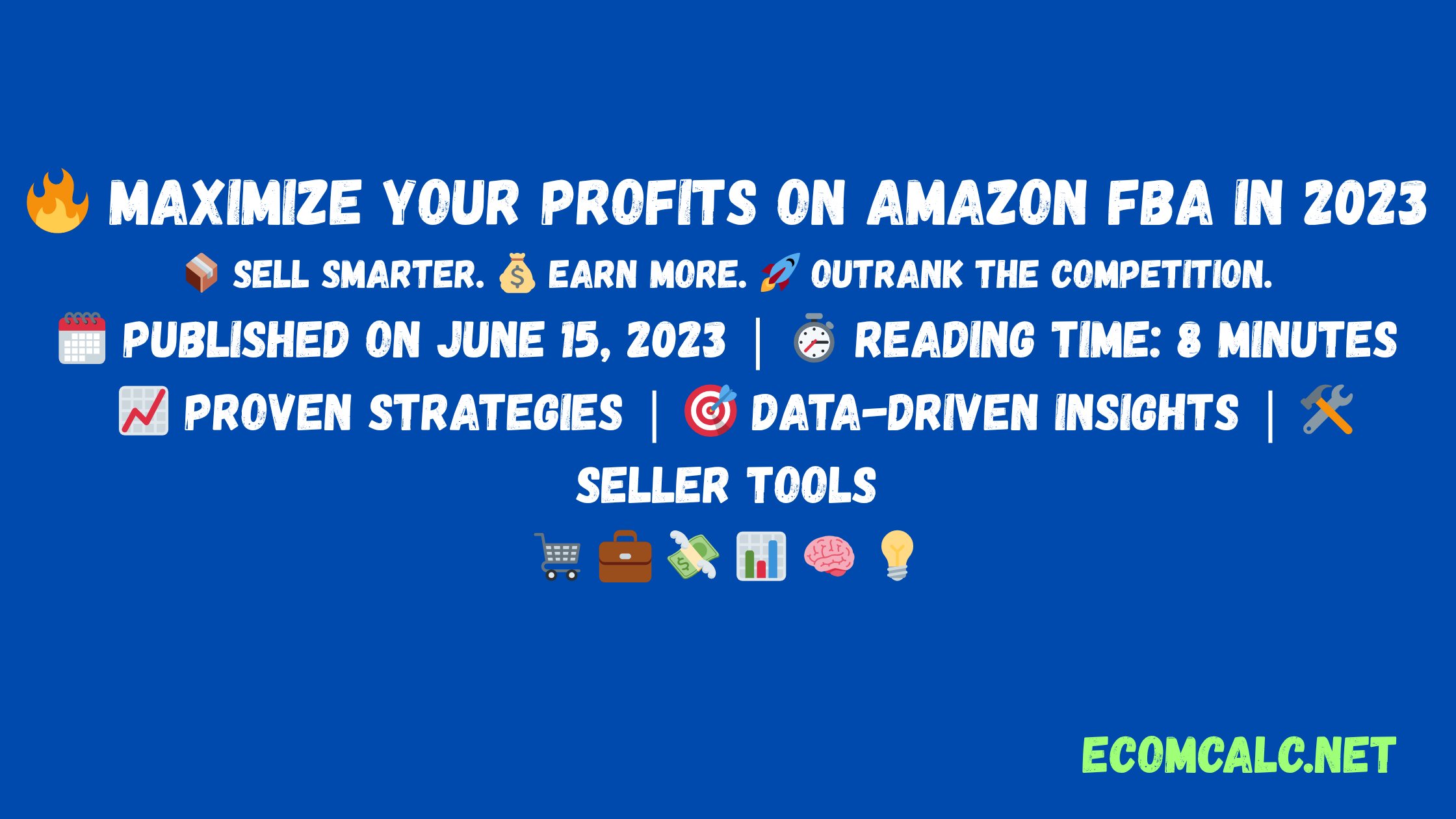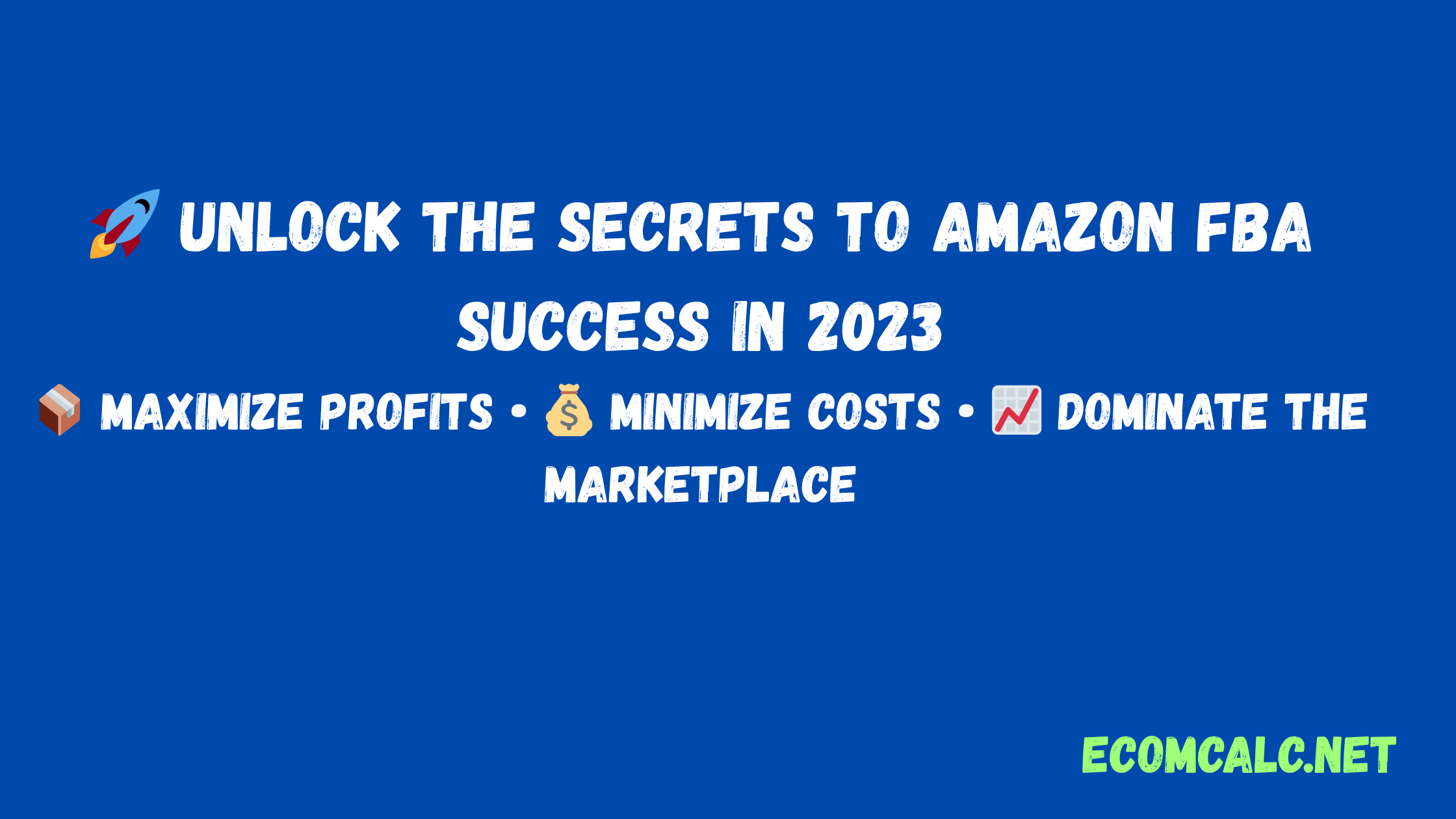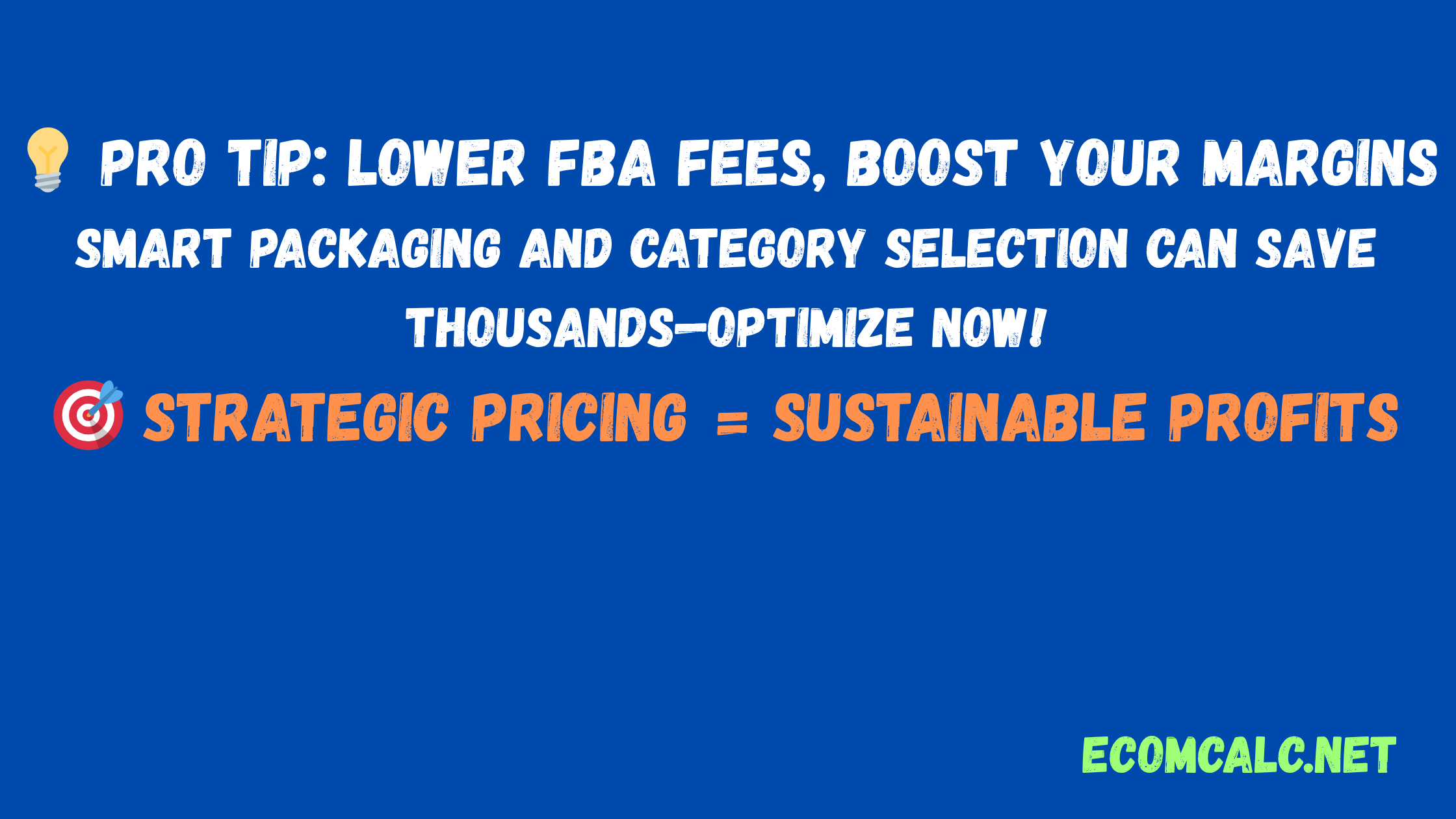How to Maximize Profits on Amazon FBA in 2023
Published on June 15, 2023 | Approximate reading time: 8 minutes
Amazon FBA (Fulfillment by Amazon) has transformed the way entrepreneurs sell products online by simplifying logistics and giving access to Amazon’s vast customer base. However, as competition intensifies and fee structures evolve, sellers must adopt strategic approaches to maximize profitability. Whether you’re a seasoned Amazon seller or just starting out, this comprehensive guide will walk you through actionable techniques to boost your Amazon FBA profits in 2023.
Table of Contents
- Understanding Amazon FBA and Its Fee Structure
- Optimize Your Product Costs
- Minimize Amazon FBA Fees
- Master Strategic Pricing
- Reduce Returns and Enhance Customer Experience
- Optimize Advertising Campaigns for Maximum ROI
- Leverage Data Analytics and Tools
- Stay Ahead with Trends and Continuous Learning
- Conclusion

1. Understanding Amazon FBA and Its Fee Structure
Before diving into profit-maximizing strategies, it’s crucial to understand how Amazon FBA works and the fees involved. Amazon FBA means you send your products to Amazon’s warehouses, and they handle storage, packaging, shipping, and customer service. This convenience comes at a cost: various fees, including fulfillment fees, referral fees, and storage fees.
- Fulfillment Fees: Charged per unit based on size and weight.
- Referral Fees: A percentage of the product’s selling price, varying by category.
- Storage Fees: Monthly charges for storing inventory, with additional fees for long-term storage.
Understanding how these fees impact your margins is the first step toward maximizing profits.
2. Optimize Your Product Costs
Your product cost forms the backbone of your profitability. The lower your acquisition cost, the wider your margin. Here are key ways to trim your product costs without compromising quality:
a. Negotiate with Suppliers
Many sellers accept initial quotes from manufacturers without negotiation. But suppliers often have flexibility, especially as order volume grows. Building a strong relationship and negotiating for better pricing, payment terms, or bulk discounts can yield significant savings.
b. Source Alternative Suppliers
Don’t get stuck with one supplier. Regularly vet alternatives to find better pricing or higher-quality materials. Consider suppliers from different regions—sometimes a change in sourcing location can reduce costs dramatically.
c. Create Product Bundles
Bundling complementary products not only adds value for customers but can also lower your per-unit fulfillment fees. For example, instead of selling a single kitchen gadget, bundle it with accessories to boost perceived value and reduce shipping costs per item.
d. Optimize Packaging Materials
Work with your supplier or fulfillment team to design compact, protective packaging that uses less material but ensures product safety. Smaller packages reduce dimensional weight fees and storage costs.
3. Minimize Amazon FBA Fees
Amazon’s fees can chip away at your profits if you don’t manage them carefully. Here’s how to keep these costs in check:
a. Use the Amazon FBA Calculator
Amazon provides a free FBA calculator that helps you estimate fees for each product. Use it to analyze your current fees and simulate how changes in size, weight, or price affect your margins.
b. Right-Size Your Packaging
Because Amazon charges based on dimensional weight, reducing package size—even slightly—can lead to substantial savings over thousands of units.
c. Choose the Right Product Category
Referral fees vary across categories, typically ranging from 6% to 45%. If your product can be listed in a category with a lower referral fee without violating Amazon policies, it can significantly improve your bottom line.
d. Manage Inventory to Avoid Long-Term Storage Fees
Long-term storage fees are charged for inventory stored over 365 days. Keep an eye on aging inventory and run promotions or clearance sales to move slow-selling products before fees accrue.
4. Master Strategic Pricing
Pricing is a balancing act between competitiveness and profitability. Here’s how to price your products strategically:
a. Use Automated Repricing Tools
Price is dynamic on Amazon. Tools like RepricerExpress or BQool help adjust your prices based on competitors, ensuring you stay competitive while protecting your profit margins.
b. Employ Psychological Pricing Techniques
Prices ending in .97 or .99 often feel more attractive to buyers compared to round numbers. This subtle tactic can increase conversion rates.
c. Run Time-Limited Promotions
Limited-time discounts or deals can spike sales velocity, which improves your product’s search ranking. Higher rankings lead to more organic sales and better overall profitability.
d. Monitor Competitor Pricing
Keep tabs on your competitors’ prices to avoid being undercut unnecessarily or pricing yourself out of the market.

5. Reduce Returns and Enhance Customer Experience
Returns not only cost money but also hurt your seller reputation. Here’s how to reduce them and improve customer satisfaction:
a. Write Clear, Honest Product Listings
Accurate descriptions and high-resolution photos help set the right expectations, reducing customer disappointment and returns.
b. Improve Product Quality and Packaging
Ensure your products meet quality standards and package them securely to prevent damage during shipping.
c. Provide Excellent Customer Service
Respond quickly to inquiries, address complaints, and resolve issues before customers leave negative feedback or request returns.
d. Solicit Customer Feedback
Encourage satisfied customers to leave positive reviews, which boosts your credibility and sales.
6. Optimize Advertising Campaigns for Maximum ROI
Amazon PPC (Pay-Per-Click) advertising is essential for visibility but can quickly drain profits if unmanaged.
a. Focus on High-Converting Keywords
Use Amazon’s search term reports to identify keywords that generate sales and pause those that don’t convert.
b. Use Negative Keywords
Exclude irrelevant search terms to prevent wasted ad spend and improve campaign efficiency.
c. Adjust Bids Based on Performance and Time
Analyze sales data to identify peak buying times and adjust your bids accordingly for better ROI.
d. Test Different Ad Types
Experiment with Sponsored Products, Sponsored Brands, and Sponsored Display ads to find the mix that works best for your products.

7. Leverage Data Analytics and Tools
Data-driven decision-making is key to staying competitive on Amazon.
a. Monitor Key Metrics
Track conversion rates, click-through rates, advertising cost of sales (ACoS), and profit margins regularly.
b. Use Third-Party Tools
Consider tools like Helium 10, Jungle Scout, or AMZScout to gain insights on market trends, competitor strategies, and keyword opportunities.
c. Analyze Customer Behavior
Use Amazon’s Brand Analytics if you have a registered brand to understand shopper behavior and preferences.
8. Stay Ahead with Trends and Continuous Learning
The Amazon marketplace is always evolving. Stay updated with:
- Changes in Amazon policies and fee structures.
- Emerging product trends and seasonal demand.
- New advertising and marketing techniques.
Join seller forums, attend webinars, and subscribe to industry newsletters to keep your knowledge current.
9. Conclusion
Maximizing profits on Amazon FBA in 2023 demands a holistic strategy that touches every part of your business—from sourcing and pricing to advertising and customer service. By optimizing product costs, managing fees smartly, pricing strategically, minimizing returns, and leveraging data, you can increase profitability sustainably.
Remember, success on Amazon is not just about selling more but selling smarter. Regularly evaluate your business metrics and adapt your approach to changing market conditions. With diligence and strategic execution, your Amazon FBA venture can thrive and deliver robust profits this year and beyond.